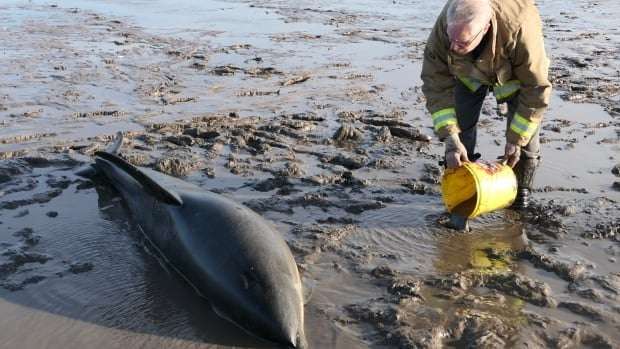Dozens of people in Digby rallied to save a stranded pod of Atlantic white-sided dolphins that had become stuck in the Annapolis Basin.
A Nova Scotia woman's trip to the grocery store ended up in mud-soaked sneakers, 16 rescued dolphins and a new sense of community.
On Friday afternoon, dozens of people in Digby, N.S,. rallied to save a stranded pod of Atlantic white-sided dolphins that had become stuck in the Annapolis Basin as the tide went out.
Linda Groocock of Annapolis Royal spotted the group of dolphins through binoculars she keeps in her car. She was on a break from running errands in Digby.
At first she just enjoyed watching them swim in the sunshine, but soon realized they were in trouble.
"The tide's going out, and more and more are starting to beach because … those Bay of Fundy tides are quite something," Groocock said Saturday.
She put out a call for help, eventually getting in touch with the Marine Animal Response Society.
Linda Groocock stands near a beached dolphin in the Annapolis Basin on Friday. A large group of citizens, federal fisheries staff and volunteer firefighters protected, and eventually freed, the group of dolphins. (Saskia Geerts)
The Halifax-based group wasn't able to travel to Digby in time, so it enlisted Digby's volunteer fire department and officials with the Department of Fisheries and Oceans to organize a rescue effort around 3 p.m.
Meanwhile, Groocock also posted about the dolphins on social media and alerted the nearby Digby Regional High school — so the first people to join her on scene were three teenage boys.
"It was like angels walking across the mud to help. It was wonderful. And then just more and more people arrived after that," Groocock said. "It was an experience of a lifetime."
Groocock said fisheries staff showed everyone what to do. Mud was packed around the dolphins to keep them lying on their bellies. Blowholes were kept clear with soaked towels.
An unusually warm November day helped the rescue effort. Groocock said the water wasn't very cold and nobody cared about getting wet and muddy.
Dozens of people joined a rescue effort to free 16 dolphins from the mud of the Annapolis Basin on Friday afternoon. (Saskia Geerts)
People were calling out to each other to make sure everyone was OK during the process, Groocock said, and there was a real sense of community.
Having recently moved to the area from Ontario, Groocock said she's had some homesickness that has been slowly easing as she gets more involved with people.
"Seeing how everybody came together yesterday, it was truly amazing for these beautiful creatures who … if it wasn't for everybody, it may not have ended so well for them," Groocock said.
"Nova Scotia strong and proud … was out there yesterday in the basin, that's for sure."
The group of about 40 people was able to get some smaller dolphins onto tarps and sleds and pull them into deeper water, but any that were freed still hung around waiting for the entire pod, Groocock said.
When the tide started coming back in, she said they could hear the dolphin's chirps to each other.
About 40 people were involved in the rescue. (Saskia Geerts)
"It's just so, so beautiful," Groocock said. "If that doesn't show a sense of family in our dolphins, I don't know what does."
Within a couple of hours, all 16 dolphins were safely returned to the sea.
Tonya Wimmer, executive director of the Maritime response group, said dolphins can survive out of the water for six hours or more as long as they're breathing freely. But she said it is ideal to get them back in the water as quickly as possible.
Although it's normal to see dolphins coming close to shore at this time of year chasing fish to eat, Wimmer said it "doesn't happen very often" that so many would become beached at once.
She said although the team couldn't physically respond this time, they gave advice to the rescue group and determined with the fire department that the muddy basin shoreline was firm enough for citizens to walk on.
"We are so very fortunate in the Maritime provinces to have people in our communities who care about these animals, who care about the oceans. And when the need is there … people answer the call," Wimmer said.
"We very much want to be able to harness that passion, but … we would never encourage people to do this on their own."

indian_chocolate on November 6th, 2022 at 06:52 UTC »
I used to volunteer for this response group in NS for about 7 years before I moved. Refloating animals was always amazing and so fulfilling… but when we did necropsies on deceased whales/dolphins, some of the things we would find inside them were pretty tragic.
TheOGJerkanator on November 5th, 2022 at 23:28 UTC »
At least they didn't get stuck in the Faroe Islands...
peter-doubt on November 5th, 2022 at 21:34 UTC »
At Digby, NS... I drove through once, and was awestruck!
The main road goes near a pier. Our timing was such that we saw a fishing boat strapped to the pier with ropes... Not merely tied with a mooring line, but fully restrained like a kidnap victim. This boat was perhaps 30 ft long...
The tide was out, and the tide at Digby is about 30 ft.. so the nearest water to theis boat was halfway across the mud flats, and 30 feet below. Only the pier and ropes kept that boat upright.
These people had quite a hike to reach the dolphins.